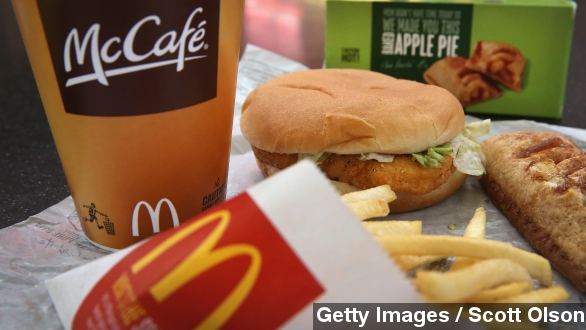Ever wondered what's really in your Big Mac? Horse meat, perhaps? Worms, even? Or how about ...
MCDONALD'S: "Are there lips and eyeballs in there, Jimmy? At what point in the process do we inject the pink slime? Can I have this to go?"
You might be surprised to find that video was actually produced by McDonald's. It's all part of a new social media campaign to address misconceptions about its food.
Customers can send in their burning questions via Facebook, YouTube and Twitter and get answers with the help of former "MythBusters" host Grant Imahara, who will visit different McDonald's suppliers as part of an online video series. (Video via Discovery / "Mythbusters")
The move comes during a rough year for the world's largest restaurant chain. The company saw its earnings slip due in part to the success of competitors that cater to millennials, including Chipotle and Panera.
That's where the new Q&A comes in. It's seen as an attempt at modifying the company's image. But it's a risky strategy.
As the chief executive of branding agency Strategic Vision David Johnson told the Los Angeles Times, the move could easily backfire. "Some of these concerns they address — a lot of people have never heard about or it was not at the forefront of their minds. … Now it may be."
That was the case with JPMorgan Chase's ill-fated Q&A session last year.
Participants in the online forum used the opportunity to ridicule the bank, which has faced several criminal probes.
Also concerning — McDonald's hasn’t always had the best track record when it comes to social media.
After all, who can forget the May unveiling of the company's new mascot, dubbed Happy?
The reactions to the demonic-looking red container with dentures was pretty much the opposite of happy — quickly earning it the name "McScary."
LITTLE BOY VIA NEW YORK MAGAZINE: "It's like a little box that's alive and saying, 'Oh, finally I've found a human I can eat."
After the McScary debacle, McDonald's is clearly hoping this latest marketing attempt will generate some positive PR among customers who question how their food is produced.
Marian Salzman of Havas PR tells USA Today while McDonald's clearly understands many millennials see their food as poor quality and unhealthy, "This feels a bit like food washing, too, because there is no conversation about salt, sugar and preservatives."
But if you are wondering, say, how a Big Mac can somehow go for years without rotting, the company has an answer for you.
It's apparently totally normal for dehydrated food. In the absence of water, mold can't grow. Who knew?
This video includes images from Getty Images and rob_rob2001 / CC BY SA 2.0.


